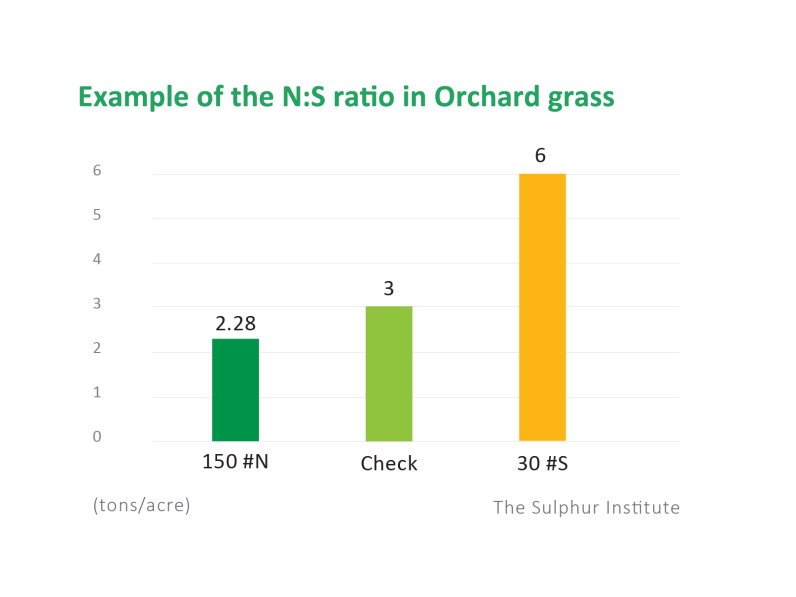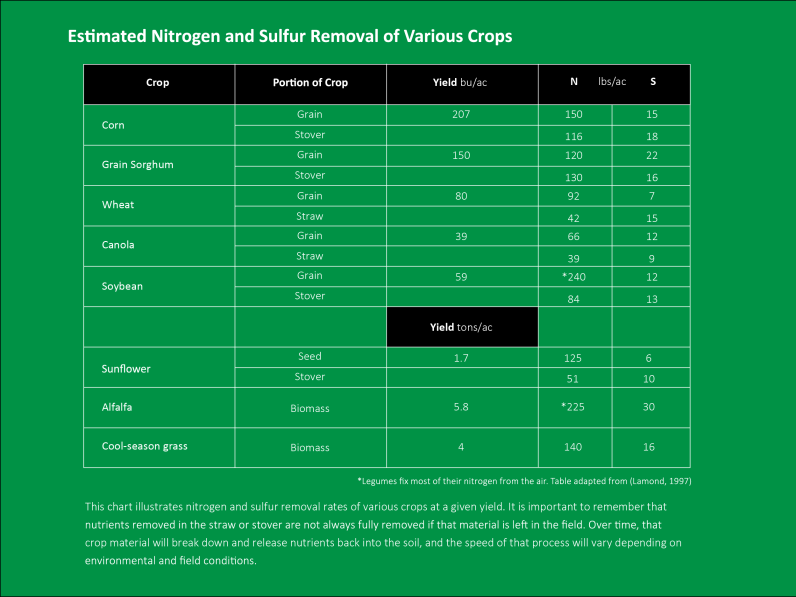Importance of Sulfur in Agriculture
Our Upcycled Sulfur

Sulfur is the fourth most important nutrient for plant health.
It is essential for the growth and development of all crops and has key functions such as:


Nitrogen & Sulfur Deficiency
The relationship between nitrogen and sulfur is very important for crop yield and quality. The two nutrients go hand in hand. Research has shown that for every 10 parts of nitrogen a plant will use, it will require about one part of sulfur. This 10:1 ratio of N:S is illustrated in the trial results to the right.
The check received no fertilizer. One of the treatments received only nitrogen at a rate of 150 pounds/acre. The other treatment only received sulfur at the rate of 30 pounds/ acre. In this trial, adding nitrogen reduced the yield below the check. Adding only sulfur doubled the yield over the check.
What happened?
The N:S ratio in the tissues of the check was 30:1. When 150 pounds of nitrogen was added, the N:S ratio jumped to 50:1. The treatment that received 30 pounds/acre of sulfur balanced the N:S ratio to 10:1. In this case, the solution was to utilize nitrogen more efficiently by adding sulfur instead of applying more nitrogen. This brought the crop into balance and thereby increased the yield.

What does sulfur deficiency look like?
The metabolic roles and mobility of sulfur in plants defines what deficiency symptoms will look like in specific crops. Sulfur is relatively immobile in plant tissue compared with nutrients like nitrogen, phosphorus, and potassium; and deficiency symptoms will appear on younger tissue first. Sulfur‐containing proteins are necessary for photosynthesis, leading to chlorotic yellowing in sulfur deficient tissue. Sulfur tissue concentration in a healthy crop ranges from 0.1 to 0.5%. Other effects of sulfur deficiency include reduced grain protein content, inhibited shoot growth rates and delayed maturation.
Additional benefits of Sulfur:
- Sulfur reduces nitrogen buildup in forage plants and turns non-protein nitrogen in plants to amino acids for protein synthesis
- Sulfur has been shown to improve drought resistance and the incidence of certain plant diseases
- Sulfur can hasten crop maturation
- Sulfur use can result in a more uniform seedling emergence by reducing soil crusting
Examples:
- Canola seed: Sulfur increases oil content
- Lettuce: Sulfur has been shown to increase yield, head size and firmness
- Chipping Potatoes: Sulfur improves uniformity and quality
- Alfalfa: Sulfur increases the longevity of stands and increases winter hardiness

Different Crops Remove Varying Amounts of Nitrogen and Sulfur from the Soil
See TableEvolution of Sulfur in Agriculture
Historically, growers did not have to consider applying sulfur as part of their crop nutrition program because much of the farmland in the US received enough sulfur through atmospheric deposition. Sources included acid rain, volcanic emissions, industrial emissions and sulfate found naturally in water and soil. Following the Clean Air Act, which improved air quality in the US, the amount of sulfur deposited through atmospheric deposition decreased, and growers began to notice sulfur deficiencies in their crops.
Today, sulfur is a vital component of all successful crop nutrition programs. Due to advanced cropping systems and high-yielding varieties that growers work with today, the sulfur requirement to maintain a balanced and healthy soil has increased.
Naturally, as the global population grows and the demand for food increases, growers look to produce more abundant and affordable food for more people. This scaling of agriculture has also contributed to the need for more sulfur.
As we look to the future, sulfur will continue to be a vital component of successful crop nutrition programs. It will also contribute to the balance and sustainability of farmland and the environment as a whole. This is why sulfur is so important for growers.


